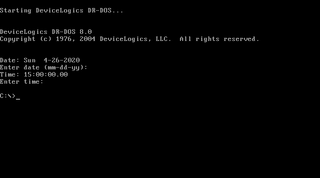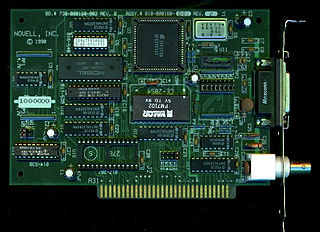Related Research Articles
Internetwork Packet Exchange (IPX) is the network layer protocol in the IPX/SPX protocol suite. IPX is derived from Xerox Network Systems' IDP. It may act as a transport layer protocol as well.

DR-DOS is an operating system of the DOS family, written for IBM PC-compatible personal computers. It was originally developed by Gary A. Kildall's Digital Research and derived from Concurrent PC DOS 6.0, which was an advanced successor of CP/M-86. As ownership changed, various later versions were produced with names including Novell DOS and Caldera OpenDOS.
pSOS is a real time operating system (RTOS), created in about 1982 by Alfred Chao, and developed/marketed for the first part of its life by his company Software Components Group (SCG). In the 1980s pSOS rapidly became the RTOS of choice for all embedded systems based on the Motorola 68000 family architecture, because it was written in 68000 assembler and was highly optimised from the start. It was also modularised, with early support for OS-aware debugging, plug-in device drivers, TCP/IP stacks, language libraries and disk subsystems. Later came source-level debugging, multi-processor support and further networking extensions.

Novell, Inc. was an American software and services company headquartered in Provo, Utah. Its most significant product was the multi-platform network operating system known as Novell NetWare, which became the dominant form of personal computer networking during the second half of the 1980s and first half of the 1990s. At its high point, NetWare had a 63 percent share of the market for network operating systems, and by the early 1990s there were over half a million NetWare-based networks installed worldwide. Novell technology contributed to the emergence of local area networks, which displaced the dominant mainframe computing model and changed computing worldwide. Novell became instrumental in making Utah Valley a focus for technology and software development.
An environment variable is a dynamic-named value that can affect the way running processes will behave on a computer. They are part of the environment in which a process runs. For example, a running process can query the value of the TEMP environment variable to discover a suitable location to store temporary files, or the HOME or USERPROFILE variable to find the directory structure owned by the user running the process.
NetWare is a discontinued computer network operating system developed by Novell, Inc. It initially used cooperative multitasking to run various services on a personal computer, using the IPX network protocol.
IPX/SPX stands for Internetwork Packet Exchange/Sequenced Packet Exchange. IPX and SPX are networking protocols used initially on networks using the Novell NetWare operating systems, but became widely used on networks deploying Microsoft Windows LANS, as they replaced NetWare LANS.
Star Trek is the code name that was given to a secret prototype project, running a port of Mac OS 7 and its applications on Intel-compatible x86 personal computers. The project, starting in February 1992, was conceived in collaboration between Apple Computer, who provided the majority of engineers, and Novell, who at the time was one of the leaders of cross-platform file-servers. The plan was that Novell would market the resulting OS as a challenge to Microsoft Windows, but the project was discontinued in 1993 and never released, although components were reused in other projects. The project was named after the Star Trek science fiction franchise with the slogan "To boldly go where no Mac has gone before".

UnixWare is a Unix operating system. It was originally released by Univel, a jointly owned venture of AT&T's Unix System Laboratories (USL) and Novell. It was then taken over by Novell. Via Santa Cruz Operation (SCO), it went on to Caldera Systems, Caldera International, and The SCO Group before it was sold to UnXis. UnixWare is typically deployed as a server rather than a desktop. Binary distributions of UnixWare are available for x86 architecture computers. UnixWare is primarily marketed as a server operating system.

Multiuser DOS is a real-time multi-user multi-tasking operating system for IBM PC-compatible microcomputers.
Long filename (LFN) support is Microsoft's backward compatible extension of the 8.3 filename naming scheme used in DOS. Long filenames can be more descriptive, including longer filename extensions common on other operating systems such as .jpeg, .tiff, .html, and .xhtml rather than specialized shortened names such as .jpg, .tif, .htm, or .xht. The standard has been common with File Allocation Table (FAT) filesystems since its first implementation in Windows NT 3.5 of 1994.
A NetWare Loadable Module (NLM) is a loadable kernel module that can be loaded into Novell's NetWare operating system. NLMs can implement hardware drivers, server functions, applications, system libraries or utilities.
Caldera OpenLinux (COL) is a defunct Linux distribution that was originally introduced by Caldera in 1997 based on the German LST Power Linux distribution, and then taken over and further developed by Caldera Systems since 1998. A successor to the Caldera Network Desktop put together by Caldera since 1995, OpenLinux was an early "business-oriented distribution" and foreshadowed the direction of developments that came to most other distributions and the Linux community generally.
Remote Initial Program Load is a protocol for starting a computer and loading its operating system from a server via a network. Such a server runs a network operating system such as LAN Manager, LAN Server, Windows NT Server, Novell NetWare, LANtastic, Solaris or Linux.
Novell Embedded Systems Technology (NEST) was a series of APIs, data formats and network protocol stacks written in a highly portable fashion intended to be used in embedded systems. The idea was to allow various small devices to access Novell NetWare services, provide such services, or use NetWare's IPX protocol as a communications system. Novell referred to this concept as "Extended Networks", and when the effort was launched they boasted that they wanted to see one billion devices connected to NetWare networks by year 2000. NEST was launched in mid-1994 countering Microsoft's similar Microsoft at Work efforts, which had been launched in 1993.

The NE1000/NE2000 is an early line of low cost Ethernet network cards originally produced by Novell by 1987. Its popularity had a significant impact on the pervasiveness of networks in computing. They are based on a National Semiconductor prototype design using their 8390 Ethernet chip.

NetWare Lite and Personal NetWare are a series of discontinued peer-to-peer local area networks developed by Novell for DOS- and Windows-based personal computers aimed at personal users and small businesses in the 1990s.
FlexOS is a discontinued modular real-time multiuser multitasking operating system (RTOS) designed for computer-integrated manufacturing, laboratory, retail and financial markets. Developed by Digital Research's Flexible Automation Business Unit in Monterey, California, in 1985, the system was considered to become a successor of Digital Research's earlier Concurrent DOS, but with a new, modular, and considerably different system architecture and portability across various processor families. Still named Concurrent DOS 68K and Concurrent DOS 286, it was renamed into FlexOS on 1 October 1986 to better differentiate the target audiences. FlexOS was licensed by several OEMs who selected it as the basis for their own operating systems like 4680 OS, 4690 OS, S5-DOS/MT and others. Unrelated to FlexOS, the original Concurrent DOS system architecture found a continuation in successors like Concurrent DOS XM and Concurrent DOS 386 as well.
DOS Protected Mode Services (DPMS) is a set of extended DOS memory management services to allow DPMS-enabled DOS drivers to load and execute in extended memory and protected mode.
References
- Causey, James. "Part IV: The Right OS for the Job; Chapter 22: NetWare - A Brief History of NetWare". High-Performance Networking Unleashed. SamsNet. Macmillan Computer Publishing. Archived from the original on 2018-09-02. Retrieved 2018-09-02.
- White, Jr., Roger Bourke (2010). "Hardware Independence". Surfing the High Tech Wave: A story of Novell's early years, 1980-1990. Archived from the original on 2018-09-02. Retrieved 2018-09-02.
- "LAN Tech" (in Korean). Archived from the original on 2006-02-10.
| This operating-system-related article is a stub. You can help Wikipedia by expanding it. |